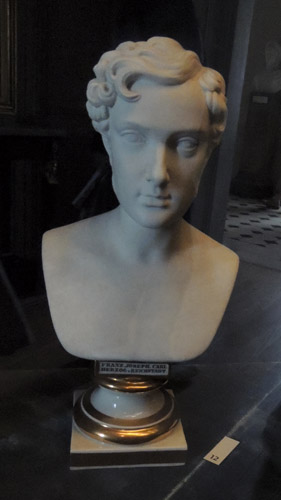 |
| Ajaccio, monument to the Roi de Rome |
Today is the 203 birthday of Napoléon François Charles Joseph Bonaparte, at his birth given the title of the King of Rome, but for most of his short life, since 1818, known as the Duke of Reichstadt. The only son of Napoleon and Marie-Louise Habsburg, and the Emperor's only legitimate child, he lived three happy years in France, adored by his father (he later claimed he remembered that period), but in 1814 he left France and never saw it again, even though formally he had been the emperor Napoleon II for a short time.
 |
| A. Menjaud, 1812 (Fontainebleau) |
His birth was announced by 101 cannon fires but he lived most of his life in what effectually was a prison, or a golden cage. By the decision of the Congress of Vienna he remained with his Austrian family, while the French one was kept away from him: he never met any of his numerous uncles, aunts or cousins, because the European powers feared that he could threaten the reactionist peace that had been achieved by the Congress.
He left Schoenbrunn only on a small number of occassions, never on his own, and ravelled as far as Pressburg (today's Bratislava, ca. 70 km from Vienna) and Graz (hardly 200 km from Vienna), even though he dreamed of visiting Italy, where his mother lived in her Duchy of Parma, estranged from both her exiled husband and her unhappy son.
 |
| Fontainebleau |
He received thorough education, even though the main objective of his teachers was to eradicate the French part of his heritage, and despite the fact that for most of his life he refused to learn - to spite the Austrians. He became an avid reader and student once eventually at the age of 20 he was pronounced adult. He neglected his fragile health, and nobody cared enough to look for the true reasons for its deterioration.
He died aged 21, lonely in a room full of people, and judging by the documents, convinced that his life had been worthless. And yet all the documents that we possess, which are not numerous and a weird selection (many apparently had been destroyed after his death), give testimony to the phrase that was allegedly coined by one of his doctors: "a soul of iron in a body of crystal".
Had he been allowed to ascend the throne, history of 19th century Europe would have for certain been different. But there was no place for his revolutionary brilliant mind in the Europe lulled into conservatism by the Holy Alliance. Gossip that he was poisoned has not died until now.
Edmond Rostand's drama L'Aiglon, focused on the last years of his life, is one of the masterpieces of French literature of the turn of the 19th/20th centuries, and the famous Sarah Bernhardt starred in its premiere in the lead role, which became one of the hallmarks of her career.
A small number of places in France and Austria are witnesses to his short and sad life. In Vienna one can see his famous cradle designed by Pierre-Paul Prud'hon, kept now in the Kaiserliche Schatzkammer.
 |
| Kaiserliche Schatzkammer |
Only some eight underground stations away from there, in the Schoenbrunn palace, the longer route takes the visitors to the room where he died (and where, by the irony of fates, his father lived in 1809, after the capture of Vienna). Among the morbid memorabilia in Schoenbrunn is the stuffed favourite pet bird of the prince.
A lovely selection of items from his happy years in France, and also some memorabilia from the later years can be seen in the Napoleonic museum in the palace of Fontainebleau; in the palace of Compiègne one can see a room where he used to live and a beautiful Egyptian revival clock that belonged to him; also in the Musée Carnavalet in Paris a couple of objects can be found.
The Louvre possesses a beautiful painting of the little King of Rome, and in Ajaccio in Corsica his only monument stand in front of the hourse where his father had been born.
He was originally buried partly in the Capucin crypt in Vienna, with all the Habsburgs, and partly in the cathedral in Vienna, but his remains were brought to Paris in 1940 (noteworthy, though, Rostand's play was forbidden under the Vichy government), and now they repose in the Dome des Invalides, in a side crypt of the main chapel with his father's sarcophagus.
 |
| Les Invalides |
No comments:
Post a Comment